ENTREPRENEURSHIP & CONSULTANCY: Types, Benefits, and Government Role
VerifiedAdded on 2022/08/30
|18
|3367
|23
Report
AI Summary
This report delves into the multifaceted world of entrepreneurship, examining its core theories, including economic, sociological, personality, social-psychological, and cognitive approaches. It categorizes entrepreneurs into types such as nascent vs. serial, necessity vs. opportunity, and natural-born vs. accidental, providing a comprehensive overview. The report further explores the economic and non-economic benefits of entrepreneurship, highlighting its role in reducing unemployment, fostering innovation, and promoting wealth creation. A significant portion of the report is dedicated to the importance and limitations of government intervention in supporting different types of entrepreneurs, particularly in emerging markets. It discusses policies, the role of the government in minimizing institutional voids, and the creation of market opportunities. The report also touches upon the characteristics of emerging markets, the concept of value creation, and the significance of nurturing emerging industries through networks. The provided assignment brief outlines the key topics, including economic complexity, product space, and the formulation of national entrepreneurship strategies, emphasizing technology firms and the design of effective policies for entrepreneurial ecosystems. The report also incorporates concepts from lectures on economic development, entrepreneurship's role in economic growth, and the Global Entrepreneurship Index (GEI).
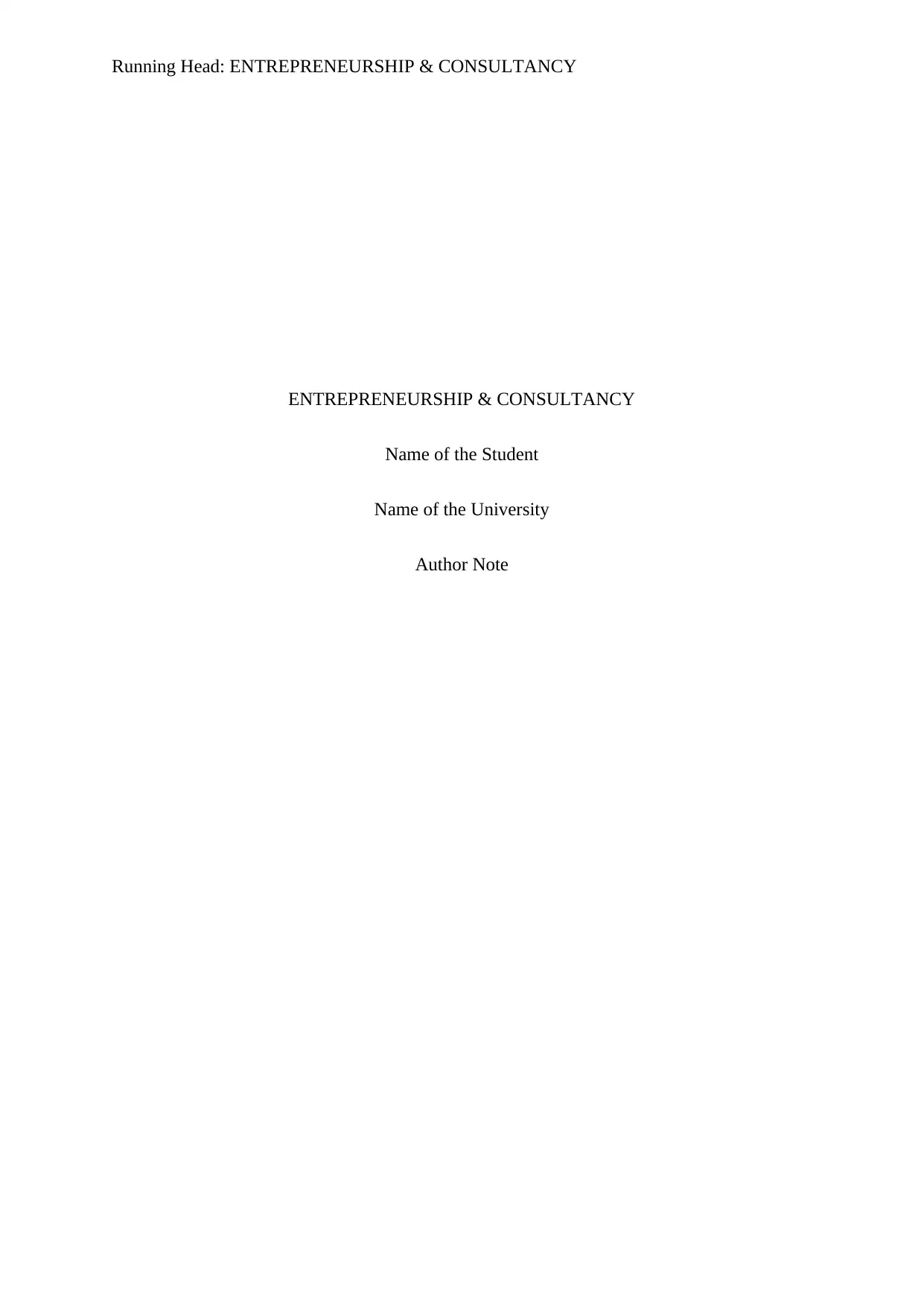
Running Head: ENTREPRENEURSHIP & CONSULTANCY
ENTREPRENEURSHIP & CONSULTANCY
Name of the Student
Name of the University
Author Note
ENTREPRENEURSHIP & CONSULTANCY
Name of the Student
Name of the University
Author Note
Paraphrase This Document
Need a fresh take? Get an instant paraphrase of this document with our AI Paraphraser
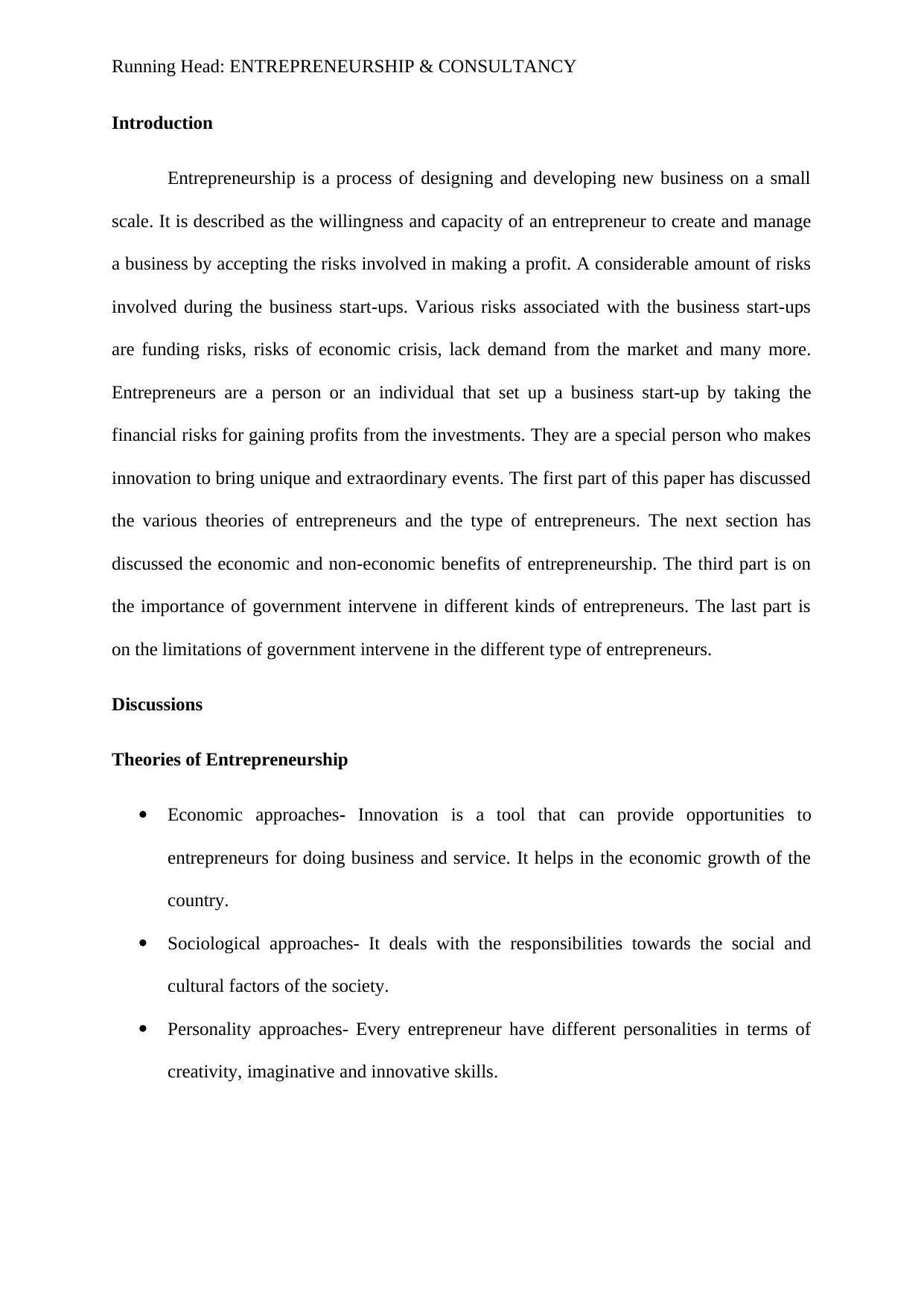
Running Head: ENTREPRENEURSHIP & CONSULTANCY
Introduction
Entrepreneurship is a process of designing and developing new business on a small
scale. It is described as the willingness and capacity of an entrepreneur to create and manage
a business by accepting the risks involved in making a profit. A considerable amount of risks
involved during the business start-ups. Various risks associated with the business start-ups
are funding risks, risks of economic crisis, lack demand from the market and many more.
Entrepreneurs are a person or an individual that set up a business start-up by taking the
financial risks for gaining profits from the investments. They are a special person who makes
innovation to bring unique and extraordinary events. The first part of this paper has discussed
the various theories of entrepreneurs and the type of entrepreneurs. The next section has
discussed the economic and non-economic benefits of entrepreneurship. The third part is on
the importance of government intervene in different kinds of entrepreneurs. The last part is
on the limitations of government intervene in the different type of entrepreneurs.
Discussions
Theories of Entrepreneurship
Economic approaches- Innovation is a tool that can provide opportunities to
entrepreneurs for doing business and service. It helps in the economic growth of the
country.
Sociological approaches- It deals with the responsibilities towards the social and
cultural factors of the society.
Personality approaches- Every entrepreneur have different personalities in terms of
creativity, imaginative and innovative skills.
Introduction
Entrepreneurship is a process of designing and developing new business on a small
scale. It is described as the willingness and capacity of an entrepreneur to create and manage
a business by accepting the risks involved in making a profit. A considerable amount of risks
involved during the business start-ups. Various risks associated with the business start-ups
are funding risks, risks of economic crisis, lack demand from the market and many more.
Entrepreneurs are a person or an individual that set up a business start-up by taking the
financial risks for gaining profits from the investments. They are a special person who makes
innovation to bring unique and extraordinary events. The first part of this paper has discussed
the various theories of entrepreneurs and the type of entrepreneurs. The next section has
discussed the economic and non-economic benefits of entrepreneurship. The third part is on
the importance of government intervene in different kinds of entrepreneurs. The last part is
on the limitations of government intervene in the different type of entrepreneurs.
Discussions
Theories of Entrepreneurship
Economic approaches- Innovation is a tool that can provide opportunities to
entrepreneurs for doing business and service. It helps in the economic growth of the
country.
Sociological approaches- It deals with the responsibilities towards the social and
cultural factors of the society.
Personality approaches- Every entrepreneur have different personalities in terms of
creativity, imaginative and innovative skills.
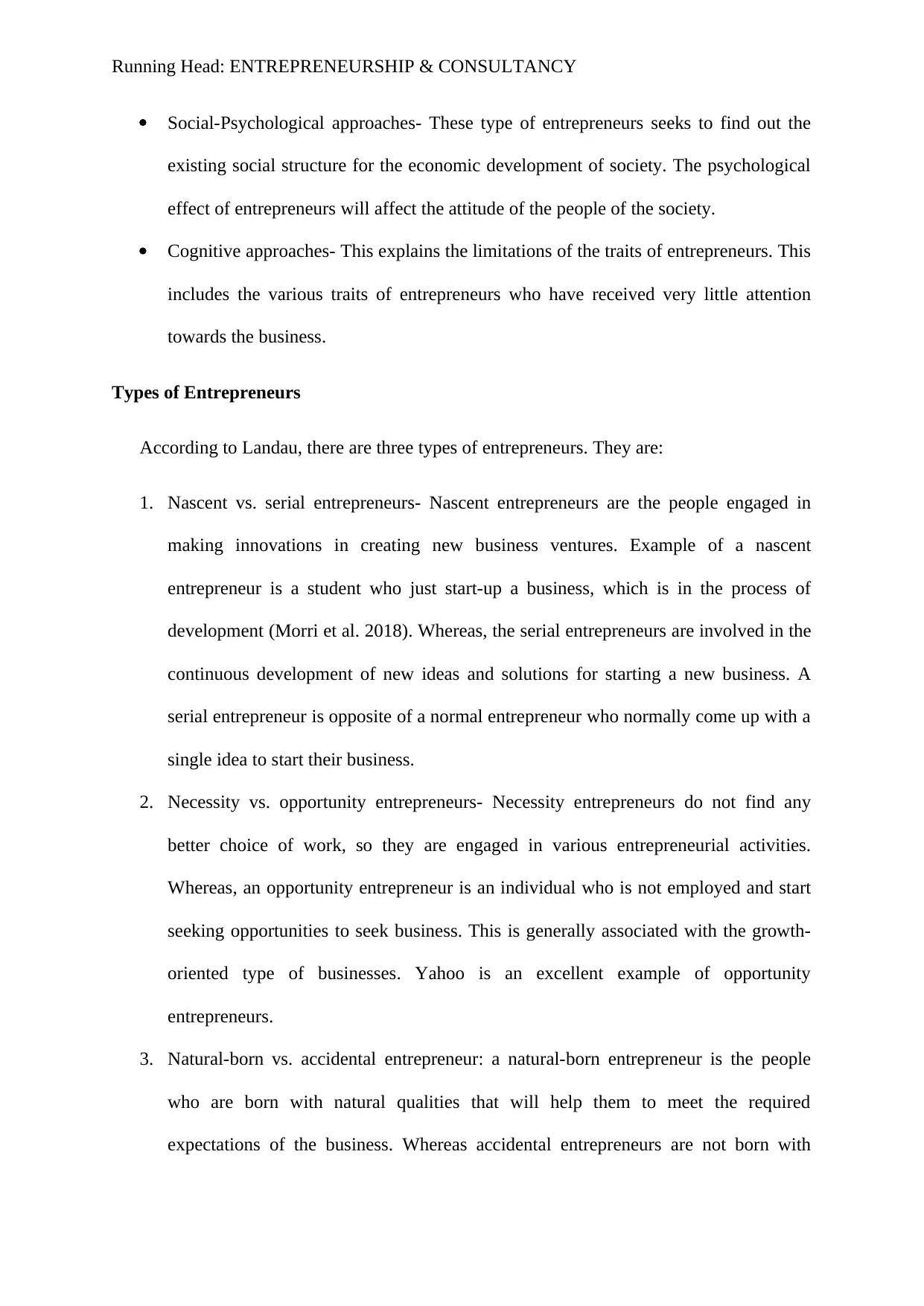
Running Head: ENTREPRENEURSHIP & CONSULTANCY
Social-Psychological approaches- These type of entrepreneurs seeks to find out the
existing social structure for the economic development of society. The psychological
effect of entrepreneurs will affect the attitude of the people of the society.
Cognitive approaches- This explains the limitations of the traits of entrepreneurs. This
includes the various traits of entrepreneurs who have received very little attention
towards the business.
Types of Entrepreneurs
According to Landau, there are three types of entrepreneurs. They are:
1. Nascent vs. serial entrepreneurs- Nascent entrepreneurs are the people engaged in
making innovations in creating new business ventures. Example of a nascent
entrepreneur is a student who just start-up a business, which is in the process of
development (Morri et al. 2018). Whereas, the serial entrepreneurs are involved in the
continuous development of new ideas and solutions for starting a new business. A
serial entrepreneur is opposite of a normal entrepreneur who normally come up with a
single idea to start their business.
2. Necessity vs. opportunity entrepreneurs- Necessity entrepreneurs do not find any
better choice of work, so they are engaged in various entrepreneurial activities.
Whereas, an opportunity entrepreneur is an individual who is not employed and start
seeking opportunities to seek business. This is generally associated with the growth-
oriented type of businesses. Yahoo is an excellent example of opportunity
entrepreneurs.
3. Natural-born vs. accidental entrepreneur: a natural-born entrepreneur is the people
who are born with natural qualities that will help them to meet the required
expectations of the business. Whereas accidental entrepreneurs are not born with
Social-Psychological approaches- These type of entrepreneurs seeks to find out the
existing social structure for the economic development of society. The psychological
effect of entrepreneurs will affect the attitude of the people of the society.
Cognitive approaches- This explains the limitations of the traits of entrepreneurs. This
includes the various traits of entrepreneurs who have received very little attention
towards the business.
Types of Entrepreneurs
According to Landau, there are three types of entrepreneurs. They are:
1. Nascent vs. serial entrepreneurs- Nascent entrepreneurs are the people engaged in
making innovations in creating new business ventures. Example of a nascent
entrepreneur is a student who just start-up a business, which is in the process of
development (Morri et al. 2018). Whereas, the serial entrepreneurs are involved in the
continuous development of new ideas and solutions for starting a new business. A
serial entrepreneur is opposite of a normal entrepreneur who normally come up with a
single idea to start their business.
2. Necessity vs. opportunity entrepreneurs- Necessity entrepreneurs do not find any
better choice of work, so they are engaged in various entrepreneurial activities.
Whereas, an opportunity entrepreneur is an individual who is not employed and start
seeking opportunities to seek business. This is generally associated with the growth-
oriented type of businesses. Yahoo is an excellent example of opportunity
entrepreneurs.
3. Natural-born vs. accidental entrepreneur: a natural-born entrepreneur is the people
who are born with natural qualities that will help them to meet the required
expectations of the business. Whereas accidental entrepreneurs are not born with
⊘ This is a preview!⊘
Do you want full access?
Subscribe today to unlock all pages.

Trusted by 1+ million students worldwide
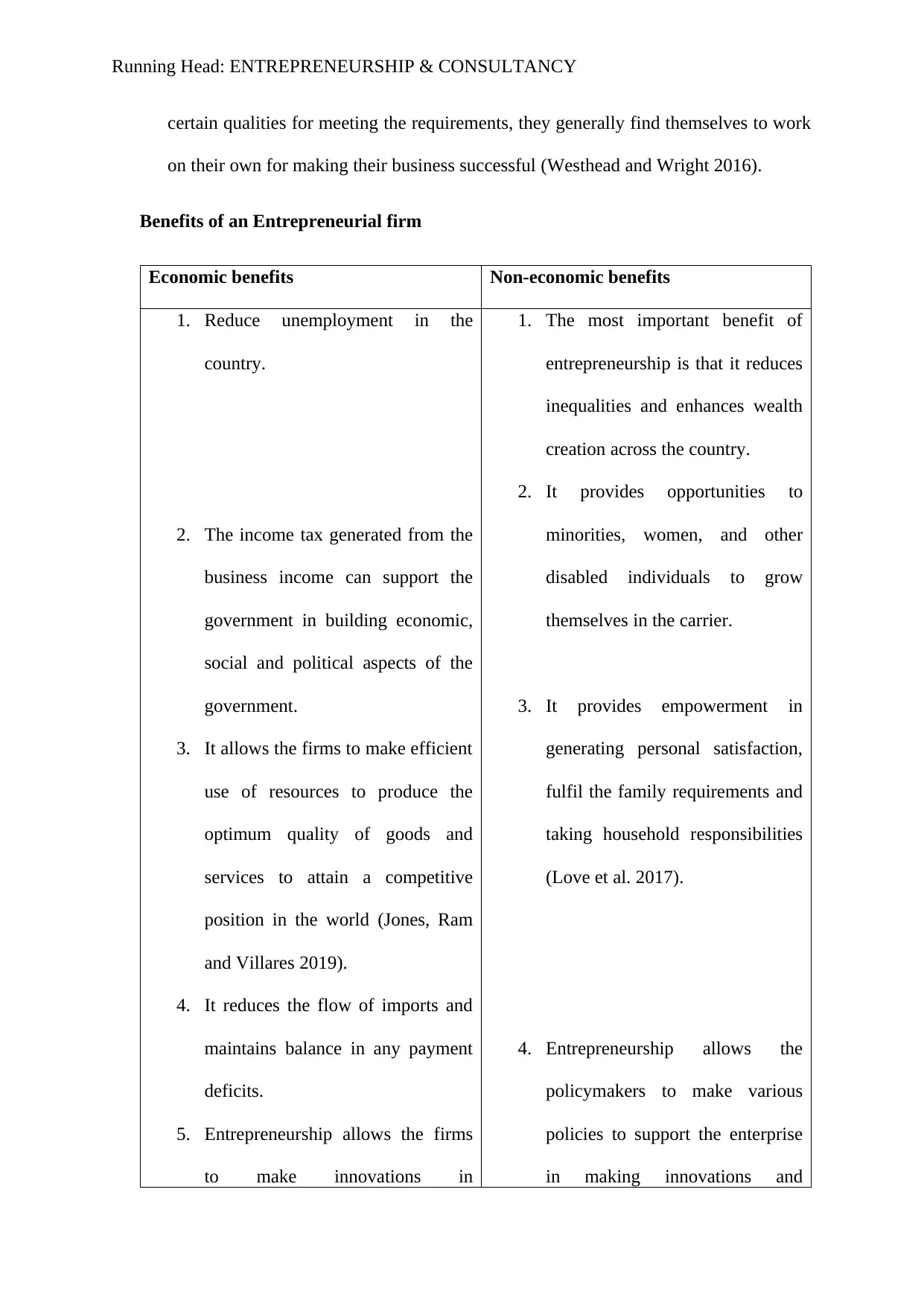
Running Head: ENTREPRENEURSHIP & CONSULTANCY
certain qualities for meeting the requirements, they generally find themselves to work
on their own for making their business successful (Westhead and Wright 2016).
Benefits of an Entrepreneurial firm
Economic benefits Non-economic benefits
1. Reduce unemployment in the
country.
2. The income tax generated from the
business income can support the
government in building economic,
social and political aspects of the
government.
3. It allows the firms to make efficient
use of resources to produce the
optimum quality of goods and
services to attain a competitive
position in the world (Jones, Ram
and Villares 2019).
4. It reduces the flow of imports and
maintains balance in any payment
deficits.
5. Entrepreneurship allows the firms
to make innovations in
1. The most important benefit of
entrepreneurship is that it reduces
inequalities and enhances wealth
creation across the country.
2. It provides opportunities to
minorities, women, and other
disabled individuals to grow
themselves in the carrier.
3. It provides empowerment in
generating personal satisfaction,
fulfil the family requirements and
taking household responsibilities
(Love et al. 2017).
4. Entrepreneurship allows the
policymakers to make various
policies to support the enterprise
in making innovations and
certain qualities for meeting the requirements, they generally find themselves to work
on their own for making their business successful (Westhead and Wright 2016).
Benefits of an Entrepreneurial firm
Economic benefits Non-economic benefits
1. Reduce unemployment in the
country.
2. The income tax generated from the
business income can support the
government in building economic,
social and political aspects of the
government.
3. It allows the firms to make efficient
use of resources to produce the
optimum quality of goods and
services to attain a competitive
position in the world (Jones, Ram
and Villares 2019).
4. It reduces the flow of imports and
maintains balance in any payment
deficits.
5. Entrepreneurship allows the firms
to make innovations in
1. The most important benefit of
entrepreneurship is that it reduces
inequalities and enhances wealth
creation across the country.
2. It provides opportunities to
minorities, women, and other
disabled individuals to grow
themselves in the carrier.
3. It provides empowerment in
generating personal satisfaction,
fulfil the family requirements and
taking household responsibilities
(Love et al. 2017).
4. Entrepreneurship allows the
policymakers to make various
policies to support the enterprise
in making innovations and
Paraphrase This Document
Need a fresh take? Get an instant paraphrase of this document with our AI Paraphraser
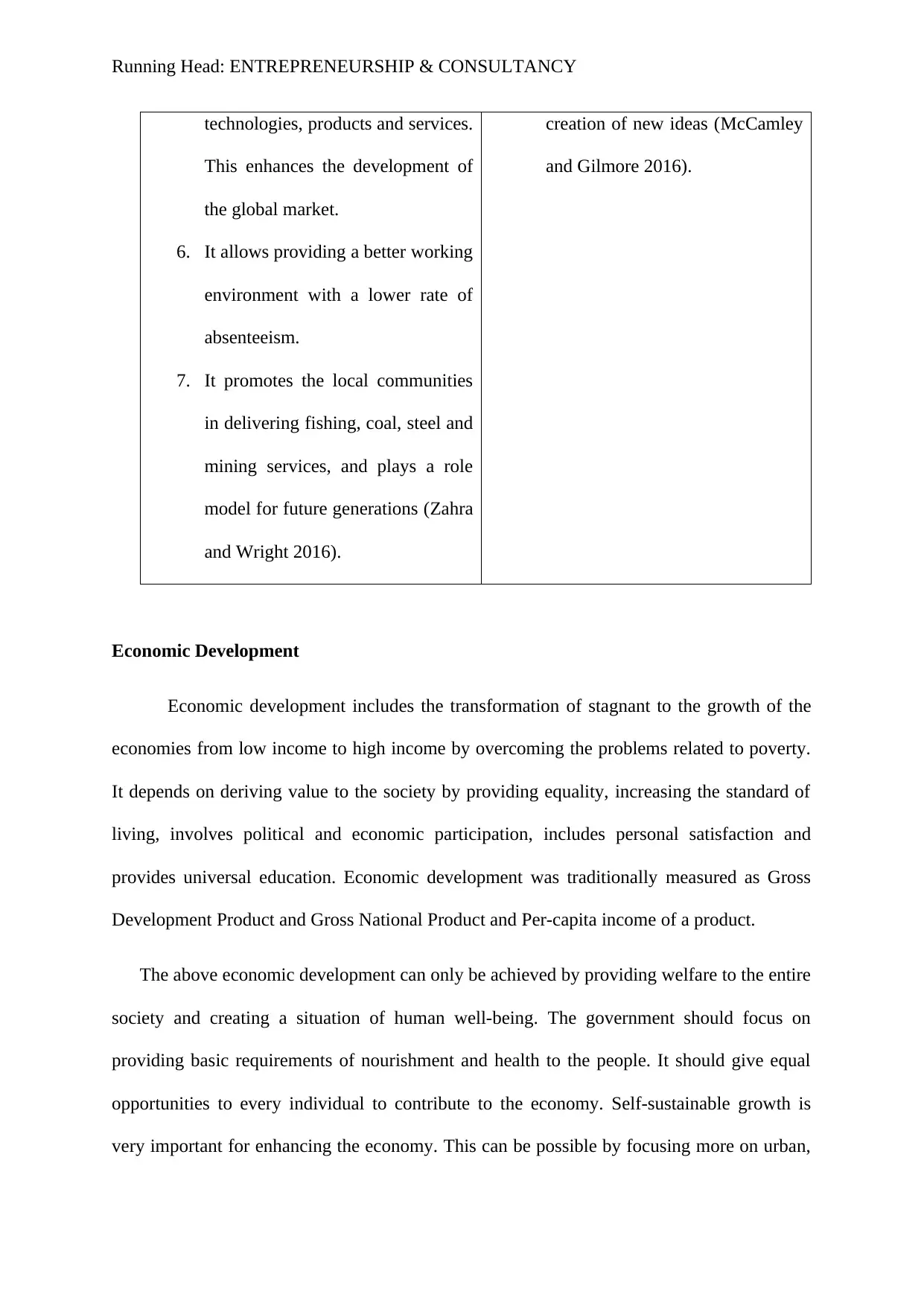
Running Head: ENTREPRENEURSHIP & CONSULTANCY
technologies, products and services.
This enhances the development of
the global market.
6. It allows providing a better working
environment with a lower rate of
absenteeism.
7. It promotes the local communities
in delivering fishing, coal, steel and
mining services, and plays a role
model for future generations (Zahra
and Wright 2016).
creation of new ideas (McCamley
and Gilmore 2016).
Economic Development
Economic development includes the transformation of stagnant to the growth of the
economies from low income to high income by overcoming the problems related to poverty.
It depends on deriving value to the society by providing equality, increasing the standard of
living, involves political and economic participation, includes personal satisfaction and
provides universal education. Economic development was traditionally measured as Gross
Development Product and Gross National Product and Per-capita income of a product.
The above economic development can only be achieved by providing welfare to the entire
society and creating a situation of human well-being. The government should focus on
providing basic requirements of nourishment and health to the people. It should give equal
opportunities to every individual to contribute to the economy. Self-sustainable growth is
very important for enhancing the economy. This can be possible by focusing more on urban,
technologies, products and services.
This enhances the development of
the global market.
6. It allows providing a better working
environment with a lower rate of
absenteeism.
7. It promotes the local communities
in delivering fishing, coal, steel and
mining services, and plays a role
model for future generations (Zahra
and Wright 2016).
creation of new ideas (McCamley
and Gilmore 2016).
Economic Development
Economic development includes the transformation of stagnant to the growth of the
economies from low income to high income by overcoming the problems related to poverty.
It depends on deriving value to the society by providing equality, increasing the standard of
living, involves political and economic participation, includes personal satisfaction and
provides universal education. Economic development was traditionally measured as Gross
Development Product and Gross National Product and Per-capita income of a product.
The above economic development can only be achieved by providing welfare to the entire
society and creating a situation of human well-being. The government should focus on
providing basic requirements of nourishment and health to the people. It should give equal
opportunities to every individual to contribute to the economy. Self-sustainable growth is
very important for enhancing the economy. This can be possible by focusing more on urban,
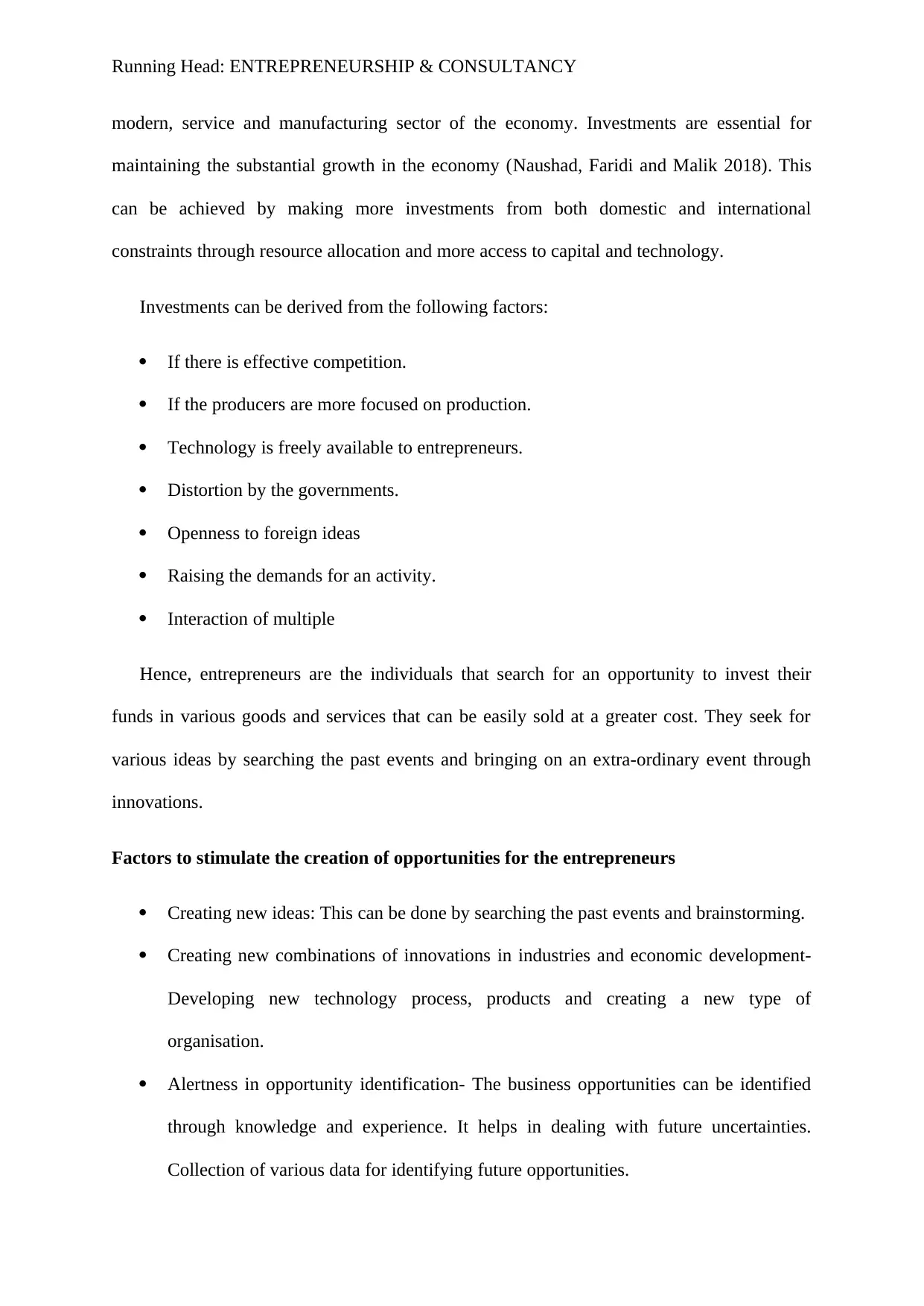
Running Head: ENTREPRENEURSHIP & CONSULTANCY
modern, service and manufacturing sector of the economy. Investments are essential for
maintaining the substantial growth in the economy (Naushad, Faridi and Malik 2018). This
can be achieved by making more investments from both domestic and international
constraints through resource allocation and more access to capital and technology.
Investments can be derived from the following factors:
If there is effective competition.
If the producers are more focused on production.
Technology is freely available to entrepreneurs.
Distortion by the governments.
Openness to foreign ideas
Raising the demands for an activity.
Interaction of multiple
Hence, entrepreneurs are the individuals that search for an opportunity to invest their
funds in various goods and services that can be easily sold at a greater cost. They seek for
various ideas by searching the past events and bringing on an extra-ordinary event through
innovations.
Factors to stimulate the creation of opportunities for the entrepreneurs
Creating new ideas: This can be done by searching the past events and brainstorming.
Creating new combinations of innovations in industries and economic development-
Developing new technology process, products and creating a new type of
organisation.
Alertness in opportunity identification- The business opportunities can be identified
through knowledge and experience. It helps in dealing with future uncertainties.
Collection of various data for identifying future opportunities.
modern, service and manufacturing sector of the economy. Investments are essential for
maintaining the substantial growth in the economy (Naushad, Faridi and Malik 2018). This
can be achieved by making more investments from both domestic and international
constraints through resource allocation and more access to capital and technology.
Investments can be derived from the following factors:
If there is effective competition.
If the producers are more focused on production.
Technology is freely available to entrepreneurs.
Distortion by the governments.
Openness to foreign ideas
Raising the demands for an activity.
Interaction of multiple
Hence, entrepreneurs are the individuals that search for an opportunity to invest their
funds in various goods and services that can be easily sold at a greater cost. They seek for
various ideas by searching the past events and bringing on an extra-ordinary event through
innovations.
Factors to stimulate the creation of opportunities for the entrepreneurs
Creating new ideas: This can be done by searching the past events and brainstorming.
Creating new combinations of innovations in industries and economic development-
Developing new technology process, products and creating a new type of
organisation.
Alertness in opportunity identification- The business opportunities can be identified
through knowledge and experience. It helps in dealing with future uncertainties.
Collection of various data for identifying future opportunities.
⊘ This is a preview!⊘
Do you want full access?
Subscribe today to unlock all pages.

Trusted by 1+ million students worldwide
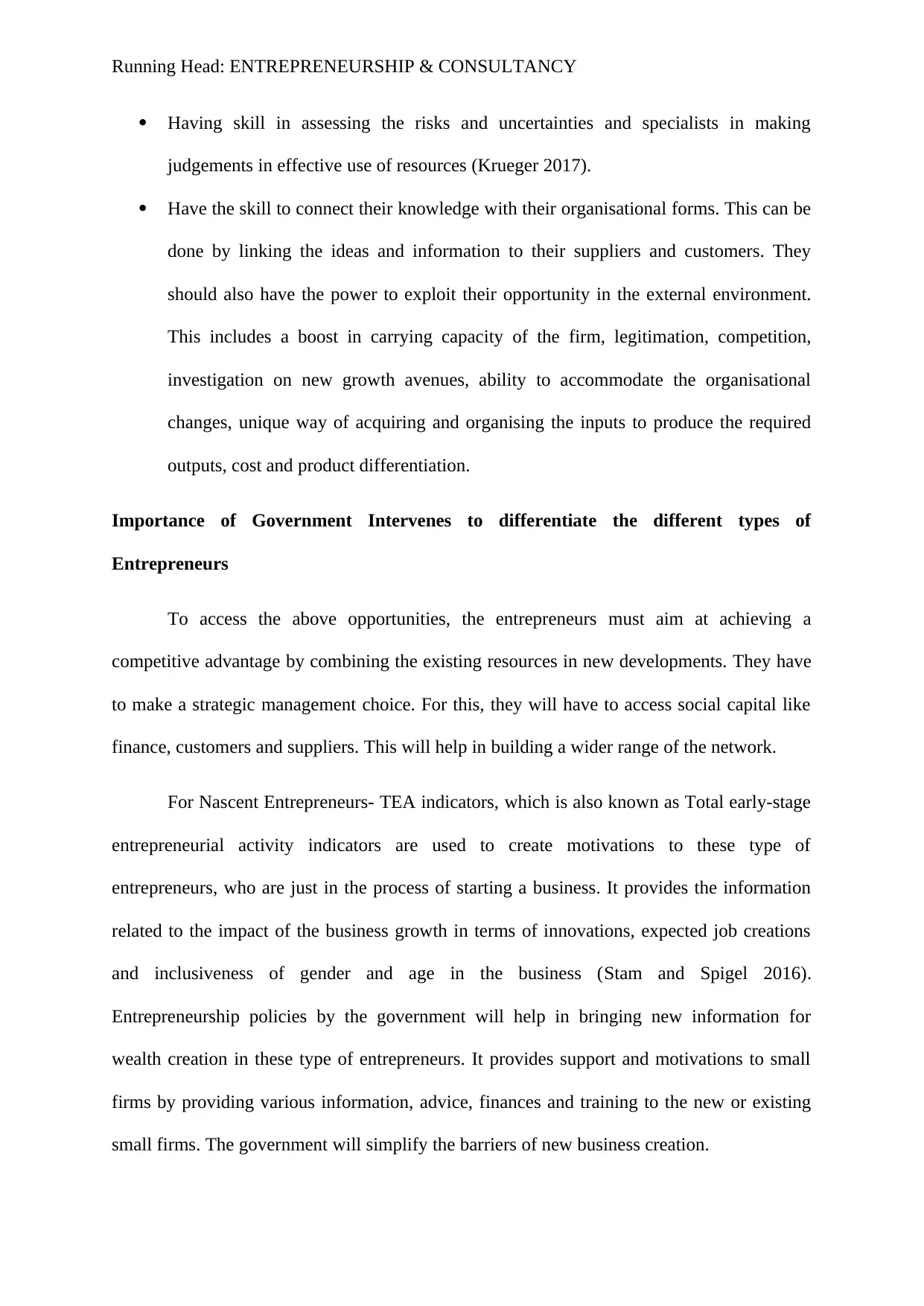
Running Head: ENTREPRENEURSHIP & CONSULTANCY
Having skill in assessing the risks and uncertainties and specialists in making
judgements in effective use of resources (Krueger 2017).
Have the skill to connect their knowledge with their organisational forms. This can be
done by linking the ideas and information to their suppliers and customers. They
should also have the power to exploit their opportunity in the external environment.
This includes a boost in carrying capacity of the firm, legitimation, competition,
investigation on new growth avenues, ability to accommodate the organisational
changes, unique way of acquiring and organising the inputs to produce the required
outputs, cost and product differentiation.
Importance of Government Intervenes to differentiate the different types of
Entrepreneurs
To access the above opportunities, the entrepreneurs must aim at achieving a
competitive advantage by combining the existing resources in new developments. They have
to make a strategic management choice. For this, they will have to access social capital like
finance, customers and suppliers. This will help in building a wider range of the network.
For Nascent Entrepreneurs- TEA indicators, which is also known as Total early-stage
entrepreneurial activity indicators are used to create motivations to these type of
entrepreneurs, who are just in the process of starting a business. It provides the information
related to the impact of the business growth in terms of innovations, expected job creations
and inclusiveness of gender and age in the business (Stam and Spigel 2016).
Entrepreneurship policies by the government will help in bringing new information for
wealth creation in these type of entrepreneurs. It provides support and motivations to small
firms by providing various information, advice, finances and training to the new or existing
small firms. The government will simplify the barriers of new business creation.
Having skill in assessing the risks and uncertainties and specialists in making
judgements in effective use of resources (Krueger 2017).
Have the skill to connect their knowledge with their organisational forms. This can be
done by linking the ideas and information to their suppliers and customers. They
should also have the power to exploit their opportunity in the external environment.
This includes a boost in carrying capacity of the firm, legitimation, competition,
investigation on new growth avenues, ability to accommodate the organisational
changes, unique way of acquiring and organising the inputs to produce the required
outputs, cost and product differentiation.
Importance of Government Intervenes to differentiate the different types of
Entrepreneurs
To access the above opportunities, the entrepreneurs must aim at achieving a
competitive advantage by combining the existing resources in new developments. They have
to make a strategic management choice. For this, they will have to access social capital like
finance, customers and suppliers. This will help in building a wider range of the network.
For Nascent Entrepreneurs- TEA indicators, which is also known as Total early-stage
entrepreneurial activity indicators are used to create motivations to these type of
entrepreneurs, who are just in the process of starting a business. It provides the information
related to the impact of the business growth in terms of innovations, expected job creations
and inclusiveness of gender and age in the business (Stam and Spigel 2016).
Entrepreneurship policies by the government will help in bringing new information for
wealth creation in these type of entrepreneurs. It provides support and motivations to small
firms by providing various information, advice, finances and training to the new or existing
small firms. The government will simplify the barriers of new business creation.
Paraphrase This Document
Need a fresh take? Get an instant paraphrase of this document with our AI Paraphraser
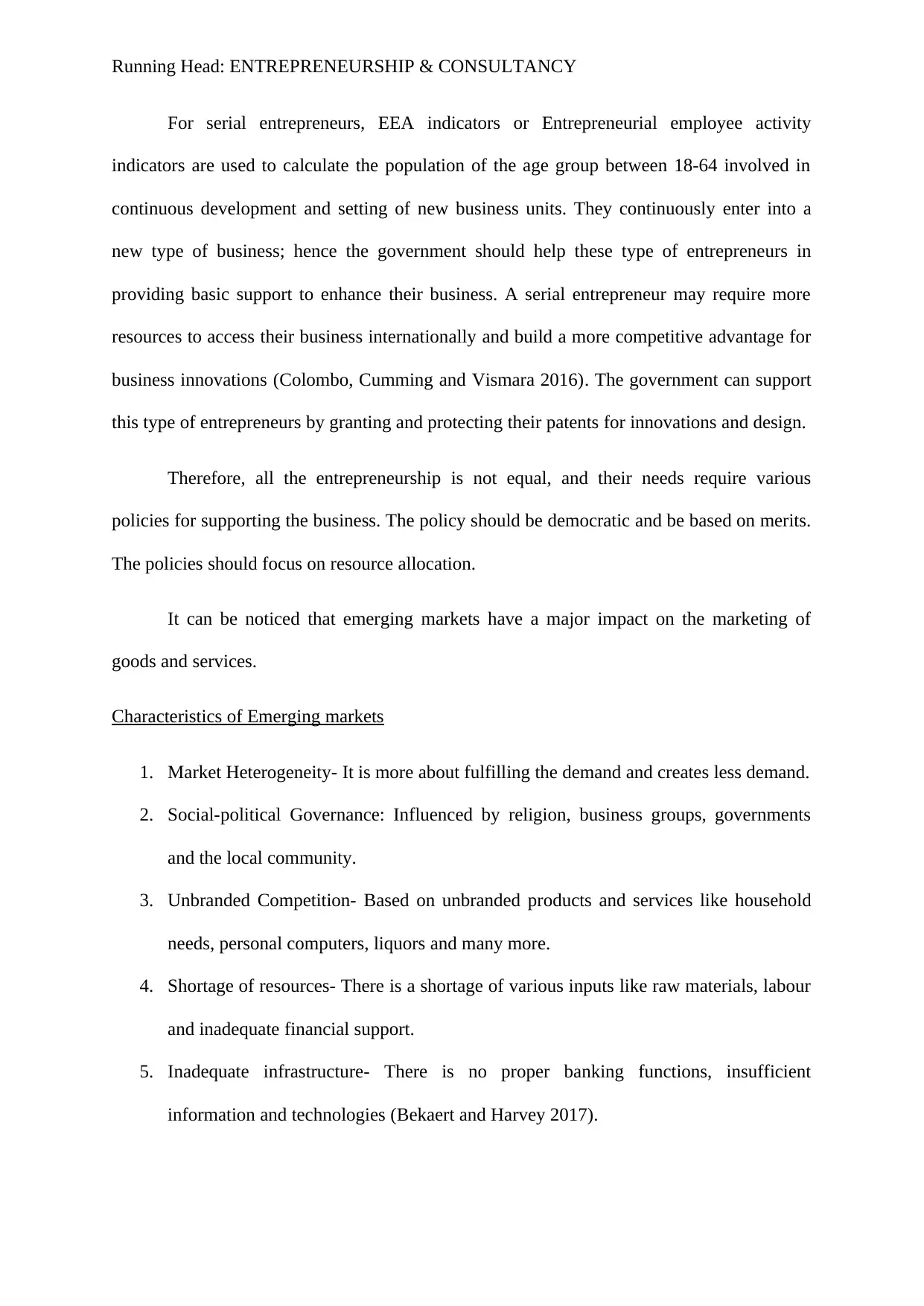
Running Head: ENTREPRENEURSHIP & CONSULTANCY
For serial entrepreneurs, EEA indicators or Entrepreneurial employee activity
indicators are used to calculate the population of the age group between 18-64 involved in
continuous development and setting of new business units. They continuously enter into a
new type of business; hence the government should help these type of entrepreneurs in
providing basic support to enhance their business. A serial entrepreneur may require more
resources to access their business internationally and build a more competitive advantage for
business innovations (Colombo, Cumming and Vismara 2016). The government can support
this type of entrepreneurs by granting and protecting their patents for innovations and design.
Therefore, all the entrepreneurship is not equal, and their needs require various
policies for supporting the business. The policy should be democratic and be based on merits.
The policies should focus on resource allocation.
It can be noticed that emerging markets have a major impact on the marketing of
goods and services.
Characteristics of Emerging markets
1. Market Heterogeneity- It is more about fulfilling the demand and creates less demand.
2. Social-political Governance: Influenced by religion, business groups, governments
and the local community.
3. Unbranded Competition- Based on unbranded products and services like household
needs, personal computers, liquors and many more.
4. Shortage of resources- There is a shortage of various inputs like raw materials, labour
and inadequate financial support.
5. Inadequate infrastructure- There is no proper banking functions, insufficient
information and technologies (Bekaert and Harvey 2017).
For serial entrepreneurs, EEA indicators or Entrepreneurial employee activity
indicators are used to calculate the population of the age group between 18-64 involved in
continuous development and setting of new business units. They continuously enter into a
new type of business; hence the government should help these type of entrepreneurs in
providing basic support to enhance their business. A serial entrepreneur may require more
resources to access their business internationally and build a more competitive advantage for
business innovations (Colombo, Cumming and Vismara 2016). The government can support
this type of entrepreneurs by granting and protecting their patents for innovations and design.
Therefore, all the entrepreneurship is not equal, and their needs require various
policies for supporting the business. The policy should be democratic and be based on merits.
The policies should focus on resource allocation.
It can be noticed that emerging markets have a major impact on the marketing of
goods and services.
Characteristics of Emerging markets
1. Market Heterogeneity- It is more about fulfilling the demand and creates less demand.
2. Social-political Governance: Influenced by religion, business groups, governments
and the local community.
3. Unbranded Competition- Based on unbranded products and services like household
needs, personal computers, liquors and many more.
4. Shortage of resources- There is a shortage of various inputs like raw materials, labour
and inadequate financial support.
5. Inadequate infrastructure- There is no proper banking functions, insufficient
information and technologies (Bekaert and Harvey 2017).
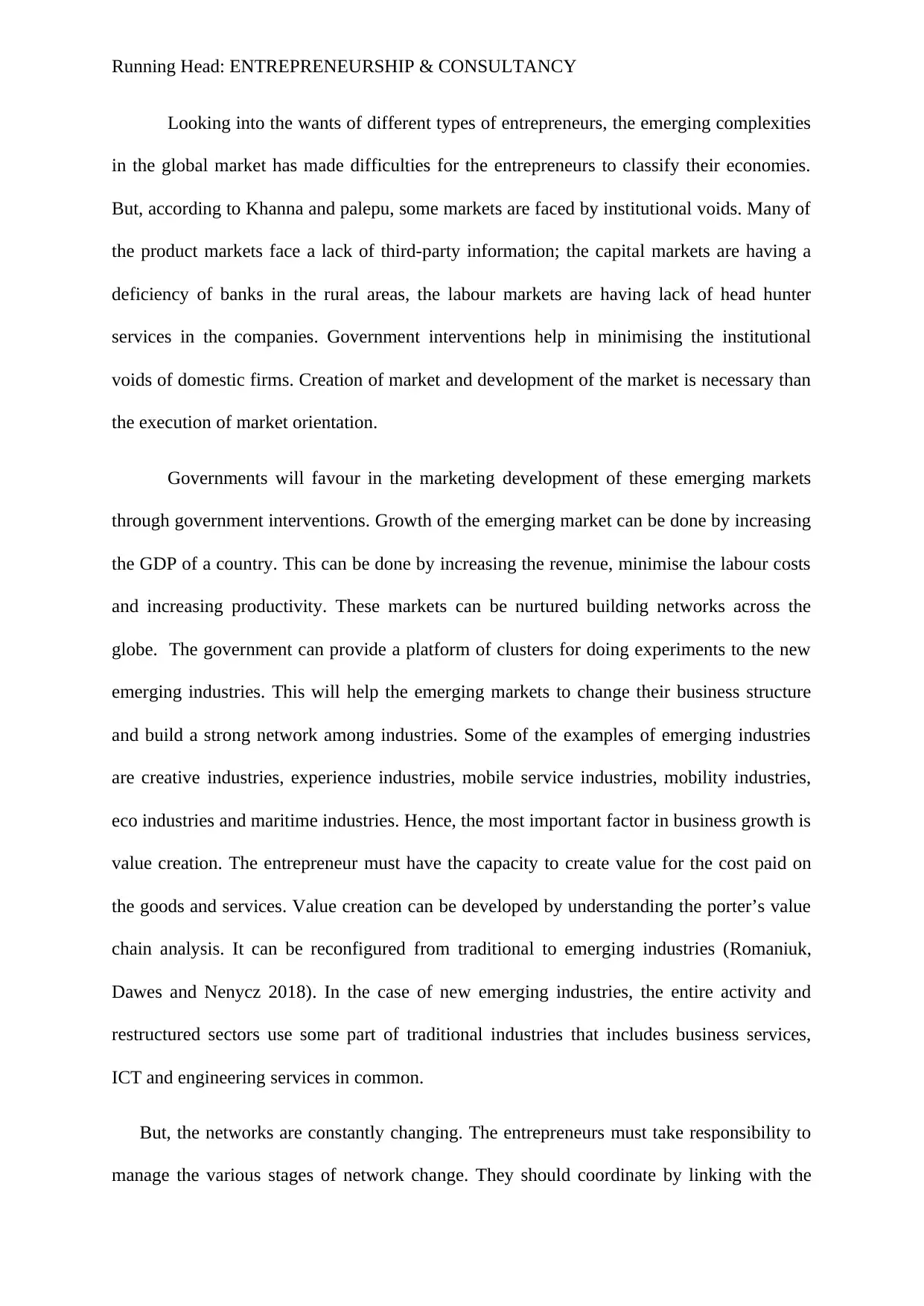
Running Head: ENTREPRENEURSHIP & CONSULTANCY
Looking into the wants of different types of entrepreneurs, the emerging complexities
in the global market has made difficulties for the entrepreneurs to classify their economies.
But, according to Khanna and palepu, some markets are faced by institutional voids. Many of
the product markets face a lack of third-party information; the capital markets are having a
deficiency of banks in the rural areas, the labour markets are having lack of head hunter
services in the companies. Government interventions help in minimising the institutional
voids of domestic firms. Creation of market and development of the market is necessary than
the execution of market orientation.
Governments will favour in the marketing development of these emerging markets
through government interventions. Growth of the emerging market can be done by increasing
the GDP of a country. This can be done by increasing the revenue, minimise the labour costs
and increasing productivity. These markets can be nurtured building networks across the
globe. The government can provide a platform of clusters for doing experiments to the new
emerging industries. This will help the emerging markets to change their business structure
and build a strong network among industries. Some of the examples of emerging industries
are creative industries, experience industries, mobile service industries, mobility industries,
eco industries and maritime industries. Hence, the most important factor in business growth is
value creation. The entrepreneur must have the capacity to create value for the cost paid on
the goods and services. Value creation can be developed by understanding the porter’s value
chain analysis. It can be reconfigured from traditional to emerging industries (Romaniuk,
Dawes and Nenycz 2018). In the case of new emerging industries, the entire activity and
restructured sectors use some part of traditional industries that includes business services,
ICT and engineering services in common.
But, the networks are constantly changing. The entrepreneurs must take responsibility to
manage the various stages of network change. They should coordinate by linking with the
Looking into the wants of different types of entrepreneurs, the emerging complexities
in the global market has made difficulties for the entrepreneurs to classify their economies.
But, according to Khanna and palepu, some markets are faced by institutional voids. Many of
the product markets face a lack of third-party information; the capital markets are having a
deficiency of banks in the rural areas, the labour markets are having lack of head hunter
services in the companies. Government interventions help in minimising the institutional
voids of domestic firms. Creation of market and development of the market is necessary than
the execution of market orientation.
Governments will favour in the marketing development of these emerging markets
through government interventions. Growth of the emerging market can be done by increasing
the GDP of a country. This can be done by increasing the revenue, minimise the labour costs
and increasing productivity. These markets can be nurtured building networks across the
globe. The government can provide a platform of clusters for doing experiments to the new
emerging industries. This will help the emerging markets to change their business structure
and build a strong network among industries. Some of the examples of emerging industries
are creative industries, experience industries, mobile service industries, mobility industries,
eco industries and maritime industries. Hence, the most important factor in business growth is
value creation. The entrepreneur must have the capacity to create value for the cost paid on
the goods and services. Value creation can be developed by understanding the porter’s value
chain analysis. It can be reconfigured from traditional to emerging industries (Romaniuk,
Dawes and Nenycz 2018). In the case of new emerging industries, the entire activity and
restructured sectors use some part of traditional industries that includes business services,
ICT and engineering services in common.
But, the networks are constantly changing. The entrepreneurs must take responsibility to
manage the various stages of network change. They should coordinate by linking with the
⊘ This is a preview!⊘
Do you want full access?
Subscribe today to unlock all pages.

Trusted by 1+ million students worldwide
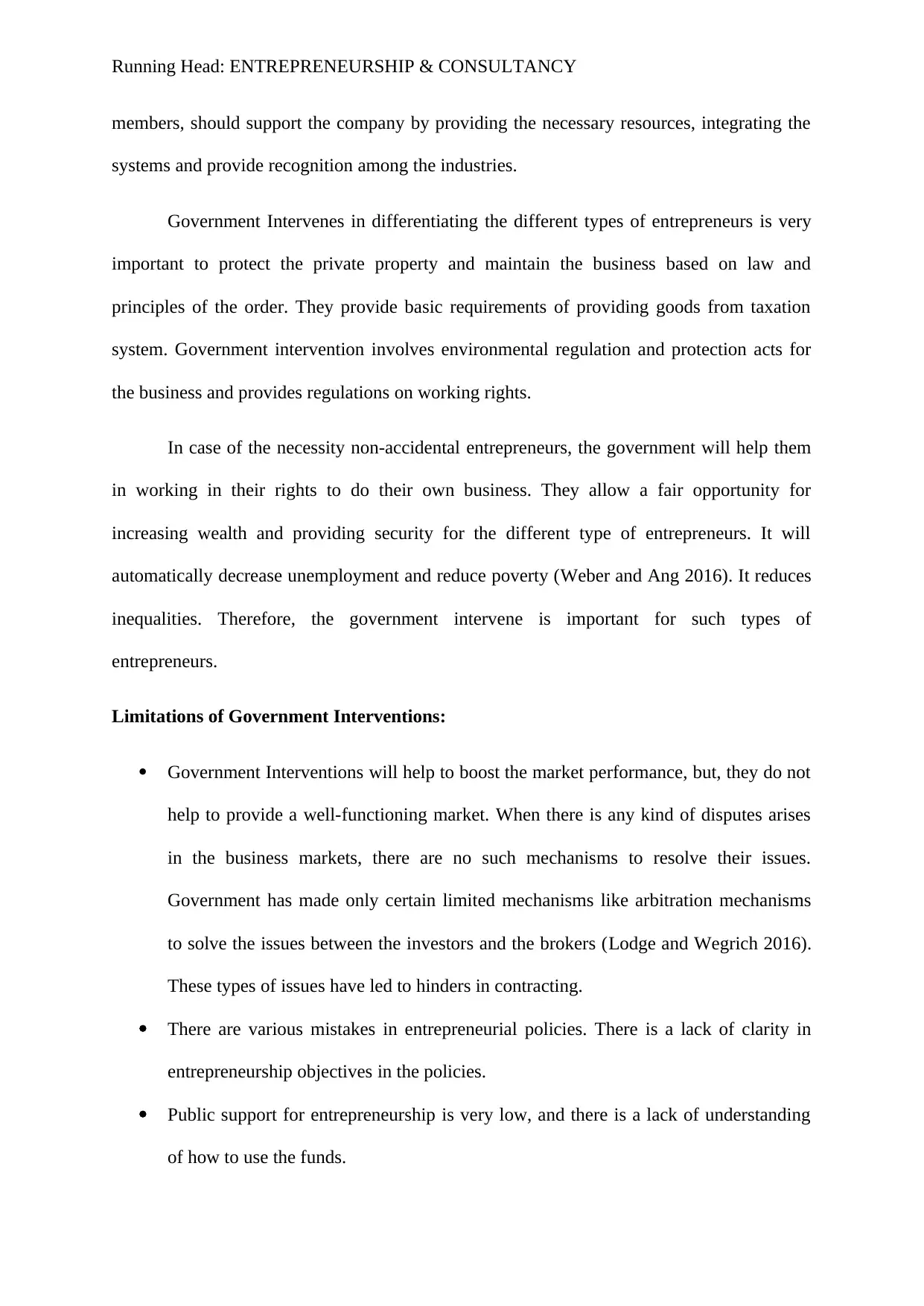
Running Head: ENTREPRENEURSHIP & CONSULTANCY
members, should support the company by providing the necessary resources, integrating the
systems and provide recognition among the industries.
Government Intervenes in differentiating the different types of entrepreneurs is very
important to protect the private property and maintain the business based on law and
principles of the order. They provide basic requirements of providing goods from taxation
system. Government intervention involves environmental regulation and protection acts for
the business and provides regulations on working rights.
In case of the necessity non-accidental entrepreneurs, the government will help them
in working in their rights to do their own business. They allow a fair opportunity for
increasing wealth and providing security for the different type of entrepreneurs. It will
automatically decrease unemployment and reduce poverty (Weber and Ang 2016). It reduces
inequalities. Therefore, the government intervene is important for such types of
entrepreneurs.
Limitations of Government Interventions:
Government Interventions will help to boost the market performance, but, they do not
help to provide a well-functioning market. When there is any kind of disputes arises
in the business markets, there are no such mechanisms to resolve their issues.
Government has made only certain limited mechanisms like arbitration mechanisms
to solve the issues between the investors and the brokers (Lodge and Wegrich 2016).
These types of issues have led to hinders in contracting.
There are various mistakes in entrepreneurial policies. There is a lack of clarity in
entrepreneurship objectives in the policies.
Public support for entrepreneurship is very low, and there is a lack of understanding
of how to use the funds.
members, should support the company by providing the necessary resources, integrating the
systems and provide recognition among the industries.
Government Intervenes in differentiating the different types of entrepreneurs is very
important to protect the private property and maintain the business based on law and
principles of the order. They provide basic requirements of providing goods from taxation
system. Government intervention involves environmental regulation and protection acts for
the business and provides regulations on working rights.
In case of the necessity non-accidental entrepreneurs, the government will help them
in working in their rights to do their own business. They allow a fair opportunity for
increasing wealth and providing security for the different type of entrepreneurs. It will
automatically decrease unemployment and reduce poverty (Weber and Ang 2016). It reduces
inequalities. Therefore, the government intervene is important for such types of
entrepreneurs.
Limitations of Government Interventions:
Government Interventions will help to boost the market performance, but, they do not
help to provide a well-functioning market. When there is any kind of disputes arises
in the business markets, there are no such mechanisms to resolve their issues.
Government has made only certain limited mechanisms like arbitration mechanisms
to solve the issues between the investors and the brokers (Lodge and Wegrich 2016).
These types of issues have led to hinders in contracting.
There are various mistakes in entrepreneurial policies. There is a lack of clarity in
entrepreneurship objectives in the policies.
Public support for entrepreneurship is very low, and there is a lack of understanding
of how to use the funds.
Paraphrase This Document
Need a fresh take? Get an instant paraphrase of this document with our AI Paraphraser
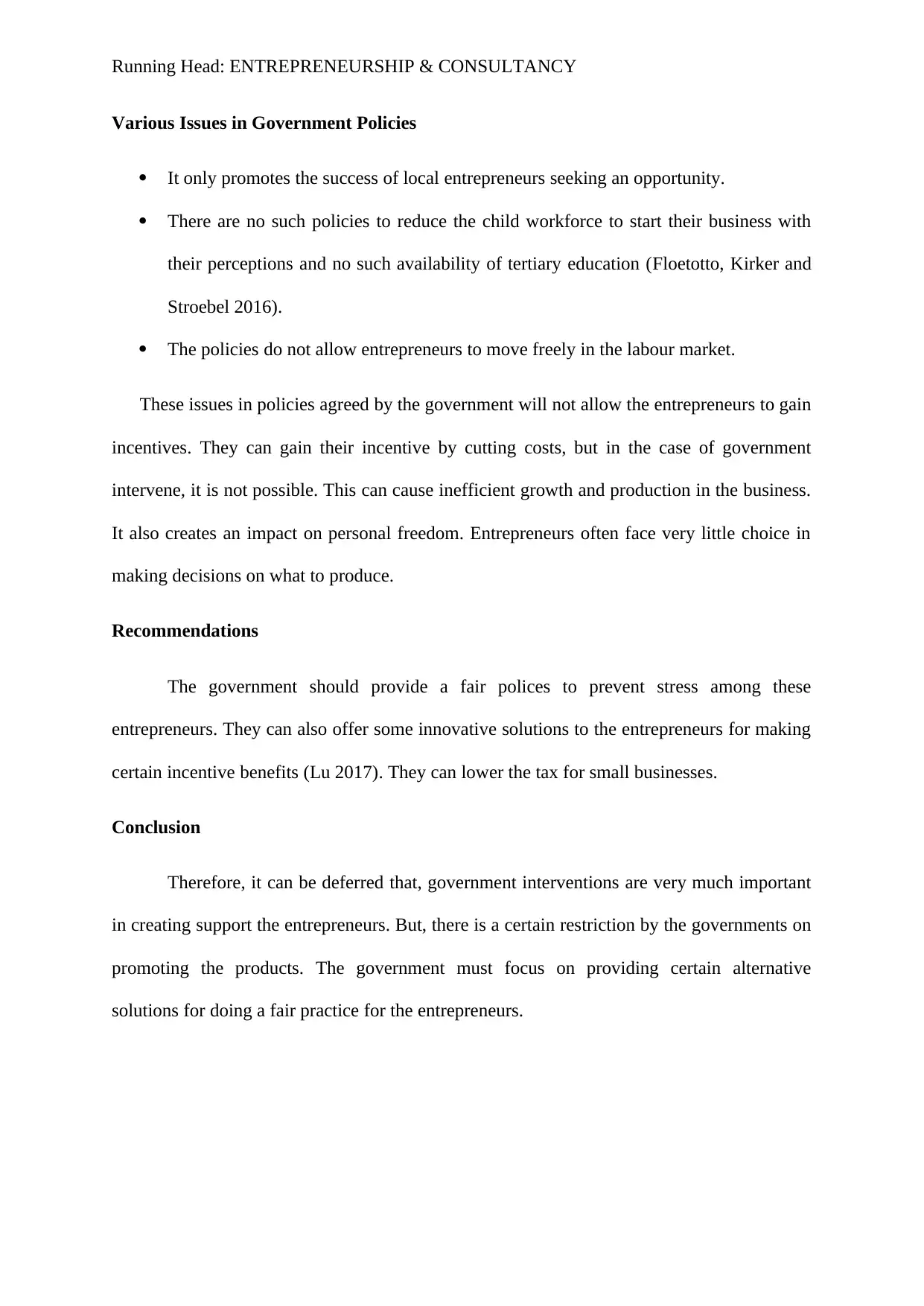
Running Head: ENTREPRENEURSHIP & CONSULTANCY
Various Issues in Government Policies
It only promotes the success of local entrepreneurs seeking an opportunity.
There are no such policies to reduce the child workforce to start their business with
their perceptions and no such availability of tertiary education (Floetotto, Kirker and
Stroebel 2016).
The policies do not allow entrepreneurs to move freely in the labour market.
These issues in policies agreed by the government will not allow the entrepreneurs to gain
incentives. They can gain their incentive by cutting costs, but in the case of government
intervene, it is not possible. This can cause inefficient growth and production in the business.
It also creates an impact on personal freedom. Entrepreneurs often face very little choice in
making decisions on what to produce.
Recommendations
The government should provide a fair polices to prevent stress among these
entrepreneurs. They can also offer some innovative solutions to the entrepreneurs for making
certain incentive benefits (Lu 2017). They can lower the tax for small businesses.
Conclusion
Therefore, it can be deferred that, government interventions are very much important
in creating support the entrepreneurs. But, there is a certain restriction by the governments on
promoting the products. The government must focus on providing certain alternative
solutions for doing a fair practice for the entrepreneurs.
Various Issues in Government Policies
It only promotes the success of local entrepreneurs seeking an opportunity.
There are no such policies to reduce the child workforce to start their business with
their perceptions and no such availability of tertiary education (Floetotto, Kirker and
Stroebel 2016).
The policies do not allow entrepreneurs to move freely in the labour market.
These issues in policies agreed by the government will not allow the entrepreneurs to gain
incentives. They can gain their incentive by cutting costs, but in the case of government
intervene, it is not possible. This can cause inefficient growth and production in the business.
It also creates an impact on personal freedom. Entrepreneurs often face very little choice in
making decisions on what to produce.
Recommendations
The government should provide a fair polices to prevent stress among these
entrepreneurs. They can also offer some innovative solutions to the entrepreneurs for making
certain incentive benefits (Lu 2017). They can lower the tax for small businesses.
Conclusion
Therefore, it can be deferred that, government interventions are very much important
in creating support the entrepreneurs. But, there is a certain restriction by the governments on
promoting the products. The government must focus on providing certain alternative
solutions for doing a fair practice for the entrepreneurs.
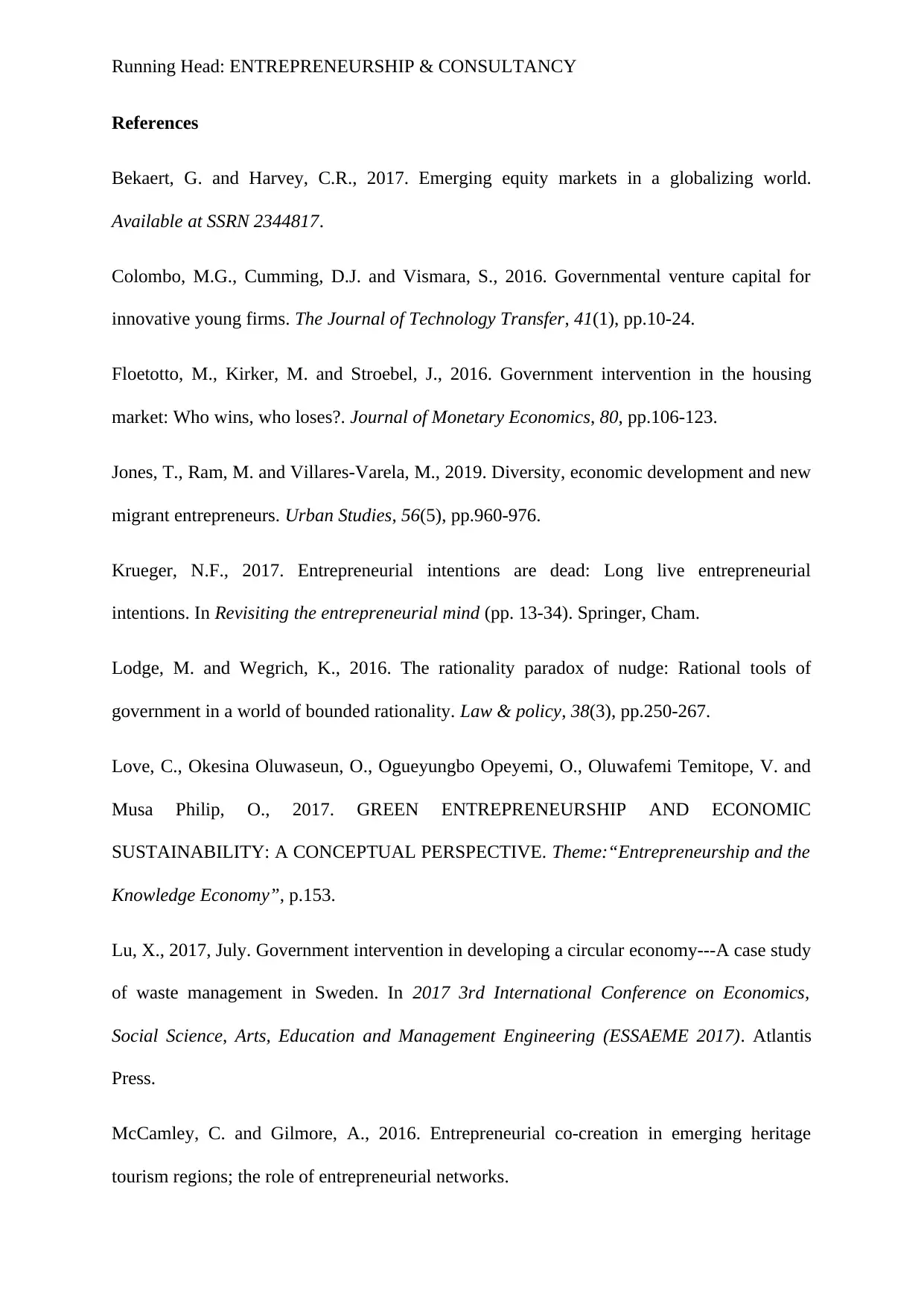
Running Head: ENTREPRENEURSHIP & CONSULTANCY
References
Bekaert, G. and Harvey, C.R., 2017. Emerging equity markets in a globalizing world.
Available at SSRN 2344817.
Colombo, M.G., Cumming, D.J. and Vismara, S., 2016. Governmental venture capital for
innovative young firms. The Journal of Technology Transfer, 41(1), pp.10-24.
Floetotto, M., Kirker, M. and Stroebel, J., 2016. Government intervention in the housing
market: Who wins, who loses?. Journal of Monetary Economics, 80, pp.106-123.
Jones, T., Ram, M. and Villares-Varela, M., 2019. Diversity, economic development and new
migrant entrepreneurs. Urban Studies, 56(5), pp.960-976.
Krueger, N.F., 2017. Entrepreneurial intentions are dead: Long live entrepreneurial
intentions. In Revisiting the entrepreneurial mind (pp. 13-34). Springer, Cham.
Lodge, M. and Wegrich, K., 2016. The rationality paradox of nudge: Rational tools of
government in a world of bounded rationality. Law & policy, 38(3), pp.250-267.
Love, C., Okesina Oluwaseun, O., Ogueyungbo Opeyemi, O., Oluwafemi Temitope, V. and
Musa Philip, O., 2017. GREEN ENTREPRENEURSHIP AND ECONOMIC
SUSTAINABILITY: A CONCEPTUAL PERSPECTIVE. Theme:“Entrepreneurship and the
Knowledge Economy”, p.153.
Lu, X., 2017, July. Government intervention in developing a circular economy---A case study
of waste management in Sweden. In 2017 3rd International Conference on Economics,
Social Science, Arts, Education and Management Engineering (ESSAEME 2017). Atlantis
Press.
McCamley, C. and Gilmore, A., 2016. Entrepreneurial co-creation in emerging heritage
tourism regions; the role of entrepreneurial networks.
References
Bekaert, G. and Harvey, C.R., 2017. Emerging equity markets in a globalizing world.
Available at SSRN 2344817.
Colombo, M.G., Cumming, D.J. and Vismara, S., 2016. Governmental venture capital for
innovative young firms. The Journal of Technology Transfer, 41(1), pp.10-24.
Floetotto, M., Kirker, M. and Stroebel, J., 2016. Government intervention in the housing
market: Who wins, who loses?. Journal of Monetary Economics, 80, pp.106-123.
Jones, T., Ram, M. and Villares-Varela, M., 2019. Diversity, economic development and new
migrant entrepreneurs. Urban Studies, 56(5), pp.960-976.
Krueger, N.F., 2017. Entrepreneurial intentions are dead: Long live entrepreneurial
intentions. In Revisiting the entrepreneurial mind (pp. 13-34). Springer, Cham.
Lodge, M. and Wegrich, K., 2016. The rationality paradox of nudge: Rational tools of
government in a world of bounded rationality. Law & policy, 38(3), pp.250-267.
Love, C., Okesina Oluwaseun, O., Ogueyungbo Opeyemi, O., Oluwafemi Temitope, V. and
Musa Philip, O., 2017. GREEN ENTREPRENEURSHIP AND ECONOMIC
SUSTAINABILITY: A CONCEPTUAL PERSPECTIVE. Theme:“Entrepreneurship and the
Knowledge Economy”, p.153.
Lu, X., 2017, July. Government intervention in developing a circular economy---A case study
of waste management in Sweden. In 2017 3rd International Conference on Economics,
Social Science, Arts, Education and Management Engineering (ESSAEME 2017). Atlantis
Press.
McCamley, C. and Gilmore, A., 2016. Entrepreneurial co-creation in emerging heritage
tourism regions; the role of entrepreneurial networks.
⊘ This is a preview!⊘
Do you want full access?
Subscribe today to unlock all pages.

Trusted by 1+ million students worldwide
1 out of 18
Related Documents
Your All-in-One AI-Powered Toolkit for Academic Success.
+13062052269
info@desklib.com
Available 24*7 on WhatsApp / Email
![[object Object]](/_next/static/media/star-bottom.7253800d.svg)
Unlock your academic potential
Copyright © 2020–2025 A2Z Services. All Rights Reserved. Developed and managed by ZUCOL.





